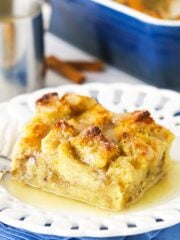This post may contain affiliate sales links. Please read my disclosure policy.
Learning how to hard boil eggs is one of those basic hurdles that we all have to go through at some point or another. Luckily, it’s super easy. By the end of this tutorial, you’ll have all the knowledge you need to make the perfect hard (or soft) boiled eggs every time.
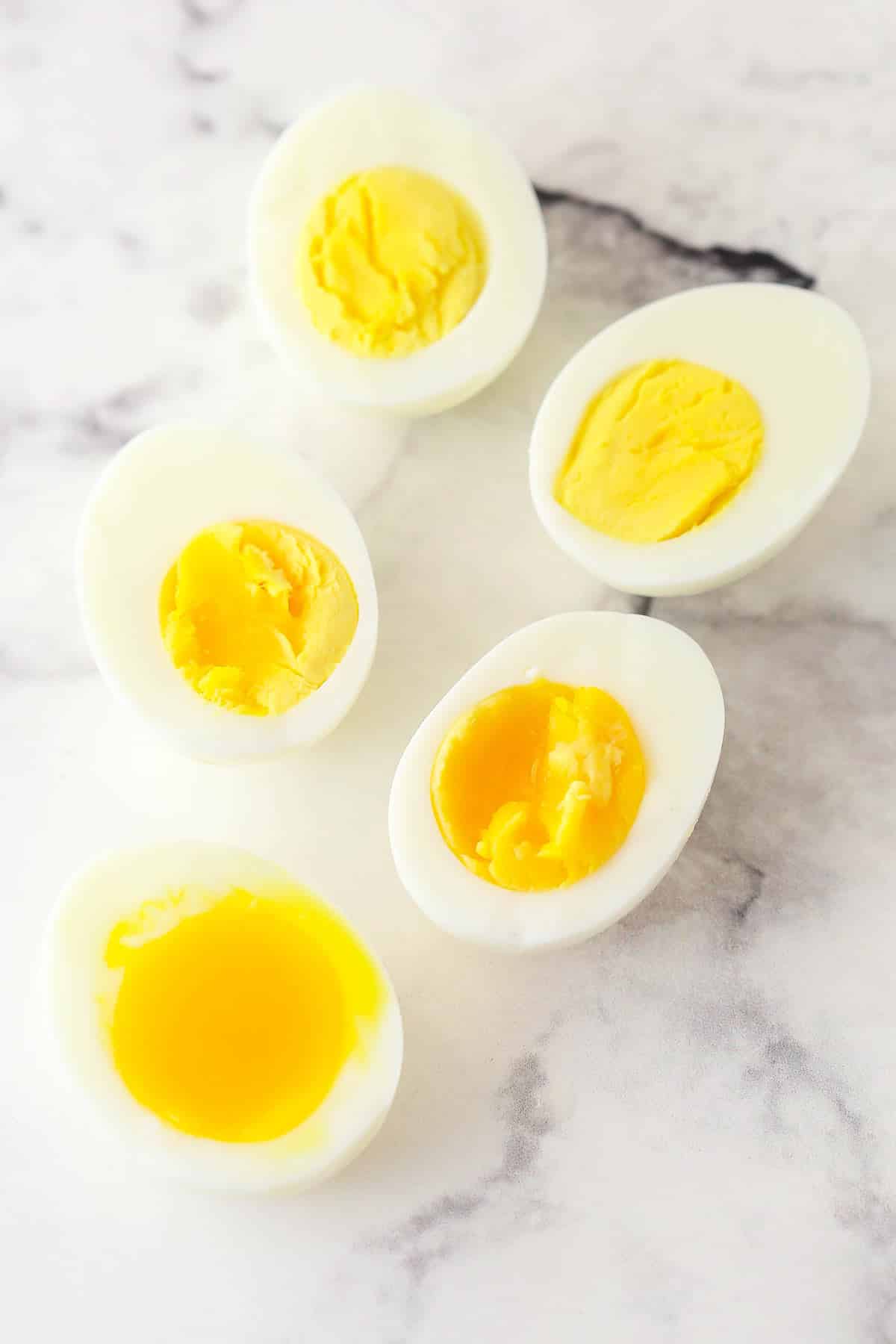
Why You’ll Love These Hard Boiled Eggs
I love having hard boiled eggs in the fridge, ready to go. They are so easy to make and there are a million ways you can use them. We eat them most mornings. Here’s why this particular recipe has my heart.
- Consistent results. A lot of hard boiled egg recipes will have you bring the water to a boil with the eggs in it. This yields inconsistent results because it greatly depends on the pan you use and how quickly your stove brings the water to a boil. The method outlined in this post boils the water first, then adds the eggs. The pan or stove doesn’t matter because the water is already boiling. Only the time in the boiling water matters. So, as long as you set a timer, you should get the same results every time.
- Customizable. I love that you can use the same recipe to make hard boiled eggs, soft boiled eggs, saucy, runny eggs, and everything in between. Same method, just different cooking times.
- Versatile. There are so many ways to use hard (or soft) boiled eggs. Enjoy them on toast for breakfast, as an easy snack, as the key ingredient in an egg salad sandwich, and more. Check out the section below titled “Serving Suggestions” for inspiration.
Hard Boiled Eggs vs Soft Boiled Eggs
Hard boiled eggs and soft boiled eggs are made using the same method. The only difference is how long they are boiled for. For soft boiled eggs, boil for 8 minutes. They have jammy, almost runny yolks and their white aren’t totally set. For hard boiled eggs, boil for 12-14 minutes. By this point, the yolks should be completely cooked through and the whites should be set.
How to Hard Boil Eggs On The Stove
Here’s a quick overview of how to make the perfect hard boiled eggs. Scroll to the recipe card below for more detailed instructions.
- Boil the water. Fill a saucepan with enough water to cover your eggs (don’t add them yet) by 1 inch and bring the water to a boil.
- Cook the eggs. Gently lower the eggs into the boiling water and cook to your desired level of doneness. Check out the next section for more.
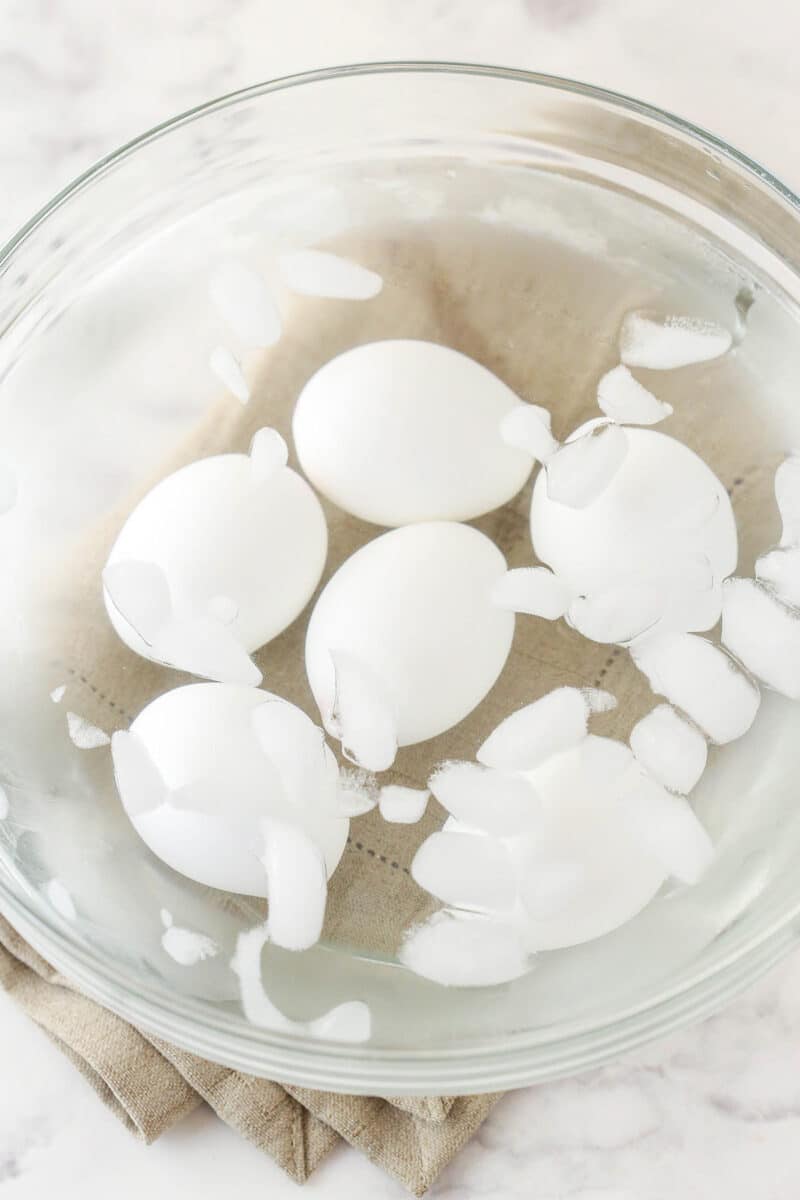
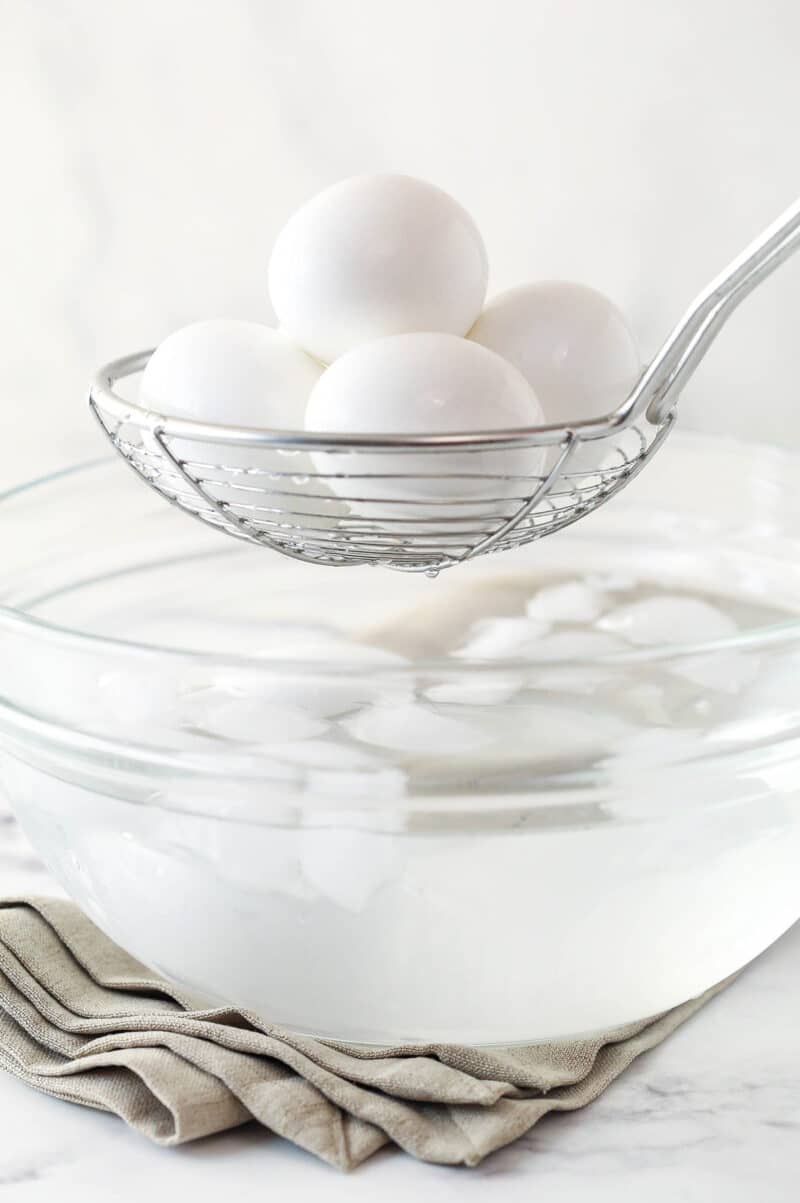
- Chill. Transfer the eggs to a bowl full of ice water and let them sit for a bit.
- Peel. Peel the eggs right away or leave the shells on until you are ready to enjoy.
How Long Do You Hard Boil Eggs?
You’ll want to allow your eggs to cook for anywhere between 6 and 14 minutes depending on your preferences for doneness. Here are some common cook times and corresponding results.
- 6 minutes – Gives you a runny yolk and soft egg white.
- 8 minutes – Gives you a yolk that is still soft and not fully cooked, but mostly holds its shape.
- 10 minutes – The early stages of a hard-boiled egg. The whites should be fully set and the yolk should be mostly set but still a little soft in the middle.
- 12 minutes – A hard-boiled egg with a lighter yolk, and just a touch of softness.
- 14 minutes – A traditional hard-boiled egg with a completely light yolk, no softness in the middle, and a firm white.
For a visual representation of the above information, see the image below.
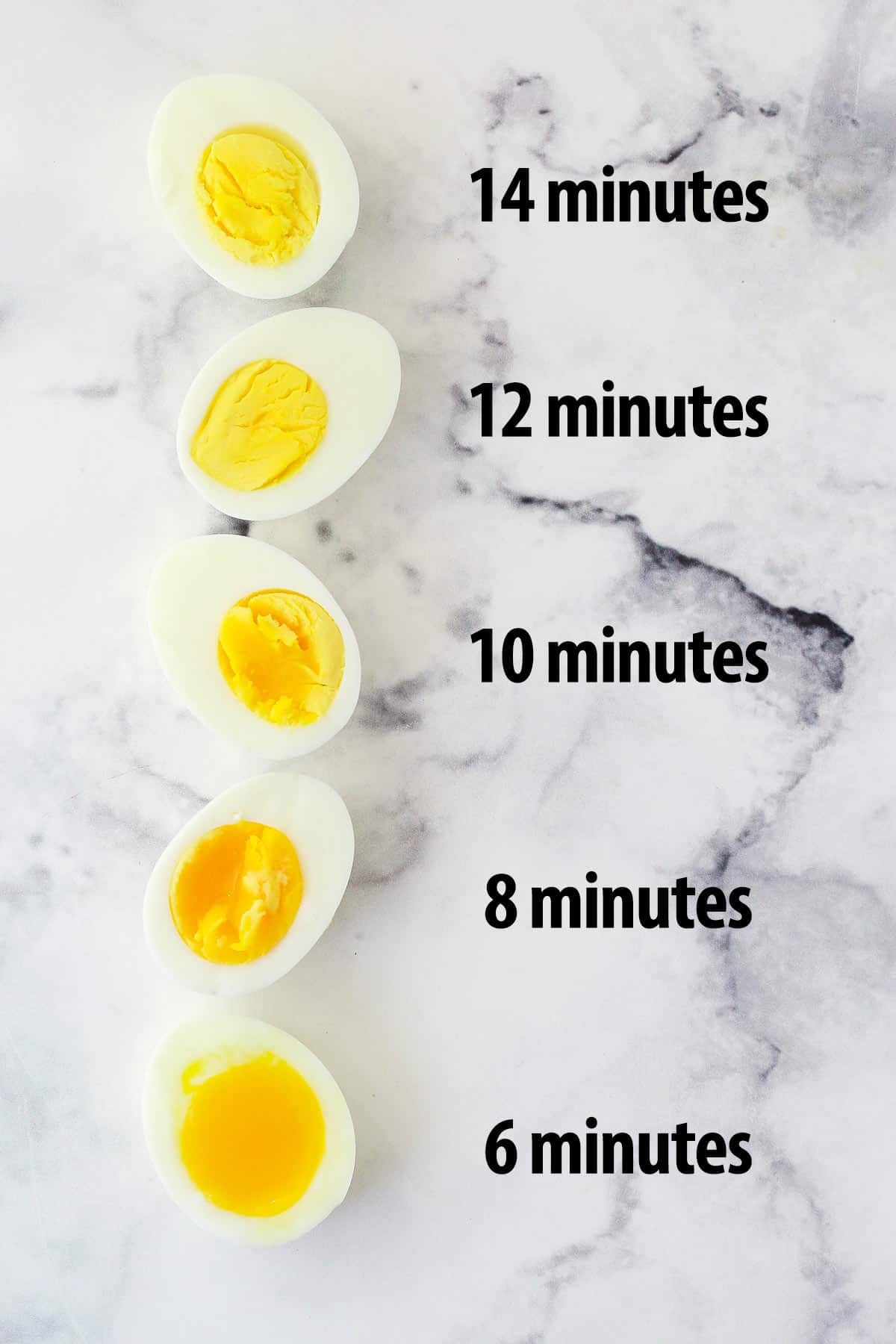
Tips for Success
Even the simplest recipes can go wrong if you don’t pay close attention to the details. Here are some tips and tricks to help you achieve the best results possible.
- Size matters. This recipe is perfect for large eggs. If you use extra large eggs, you will need to increase the boiling time a bit. If you use smaller eggs, you will need to decrease the boiling time.
- Use a large enough pan. You don’t want your eggs to stack on top of one another in the water as this may cause them to break. They should sit in a single layer at the bottom of the pan. Make sure your pan is large enough to accommodate that.
- Use the same pan every time. Stoves and pans can vary. Your eggs might cook just right in one pan but not in another. Figure out which pan you’ll use for boiled eggs and use the same one every time. Once you get the timing just right for your eggs in that particular pan, you’ll get consistent results from there on out (assuming you are using the same stove).
- Reduce the heat (temporarily). If you’re worried about your eggs breaking, reduce the heat when you add them to the pan so that the water isn’t bubbling so intensely. Just keep in mind that the boil time might be slightly longer since the water has to heat back up.
Easy-to-Peel Hard-Boiled Eggs
There are all kinds of theories as to what makes hard-boiled eggs easier to peel, but the most fool-proof and simple way I’ve found is to put the eggs in an ice bath after boiling them. Letting the eggs sit in an ice bath for a while stops the cooking process, which helps prevent over-cooking. It also encourages the shells to separate from the whites, making for easier peeling. Perfect every time!
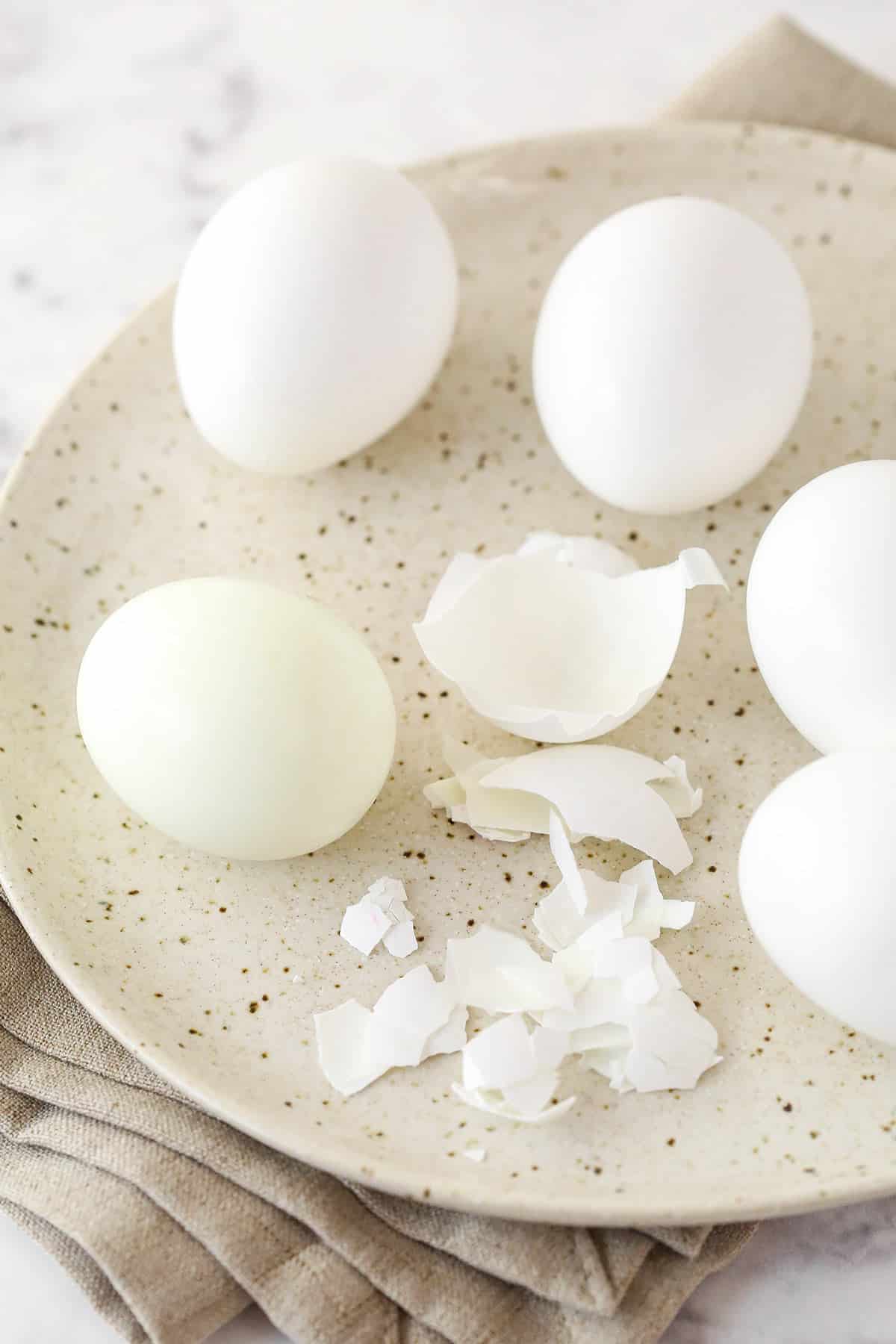
Serving Suggestions
I love that you can enjoy hard (or soft) boiled eggs any time of day. Enjoy them for breakfast, as a snack, for lunch, and more.
- Breakfast. Slice a couple of hard or soft boiled eggs up, spread them over toasted, buttered bread (or this awesome Beer Bread), and sprinkle them with salt and pepper. Alternatively, dip toasted bread into runny, extra soft boiled egg yolks.
- Snack. Hard boiled eggs are the perfect grab-and-go snack. Pop one in your lunch box or grab one as you run out the door. Peel it and eat it for a quick punch of protein.
- Lunch. You can easily turn hard boiled eggs into egg salad and pack it into a delightful sandwich for lunch. Another yummy lunch idea is chopping up a hard boiled egg or two and tossing it into a salad for some extra protein. Try them in my Herb Chicken Cobb Salad.
- Appetizer. Turn hard boiled eggs into Deviled Eggs. These elegant appetizer bites are always a crowd-pleaser.
Proper Storage
Once the eggs have cooled completely, seal them in an airtight container. You can store hard boiled eggs in the fridge for up to 1 week and soft boiled eggs for up to 3 days. Store the eggs peeled or unpeeled. Just note that they will stay fresh for a bit longer if you leave them in their shells.
I do not recommend freezing hard boiled eggs. The whites will become rubbery and unpleasant to eat.
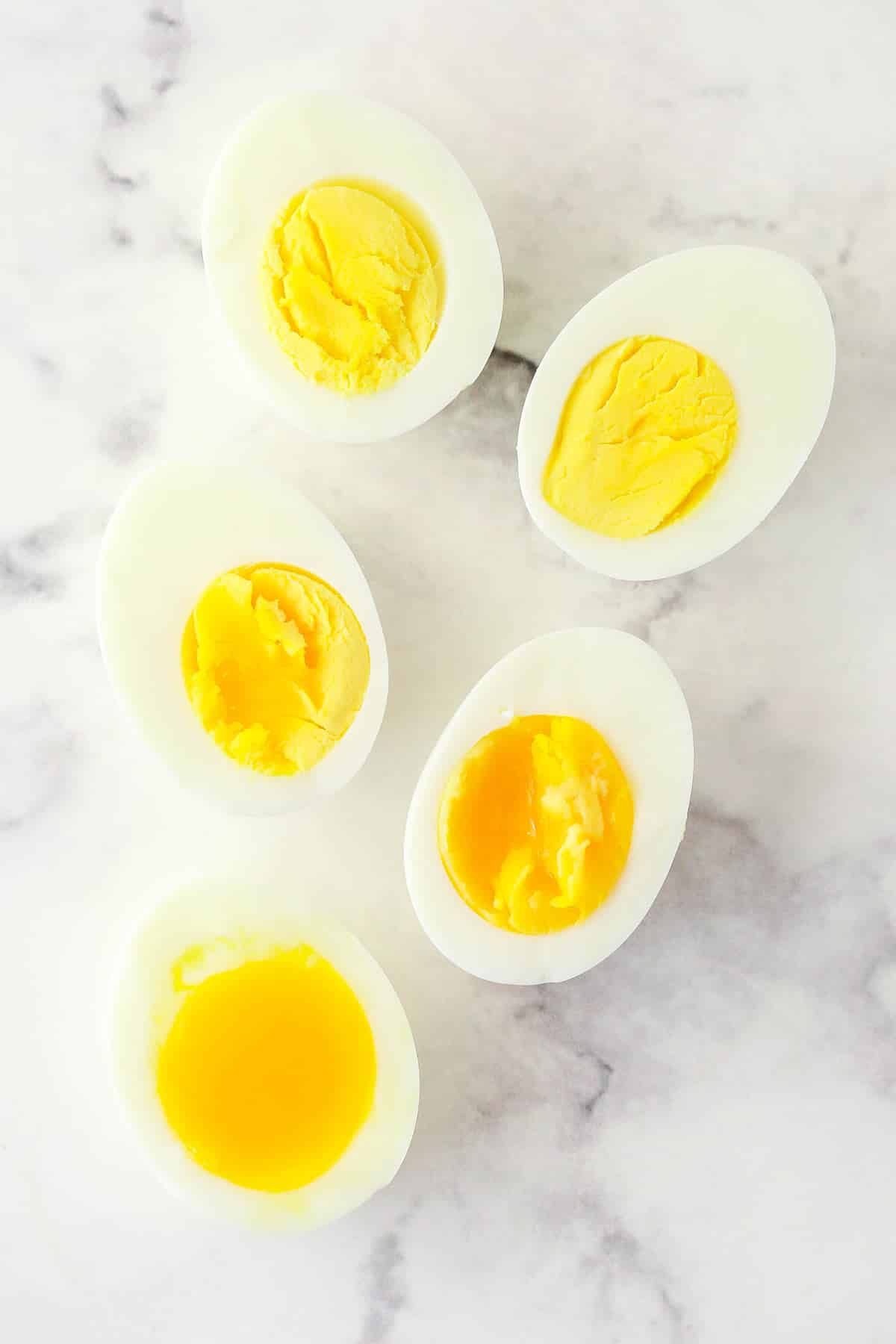
More Egg Recipes To Try
Now that you’ve learned how to hard boil eggs on the stove, it’s time to dive into some other awesome egg-centric recipes.
- Overnight Sausage and Egg Breakfast Casserole
- Deviled Eggs
- Hashbrown Breakfast Casserole
- Overnight Baked Banana French Toast Casserole
- Homemade Eggnog Recipe
- Easy Bread Pudding Recipe
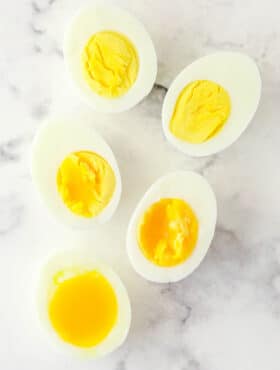
How to Hard Boil Eggs
- Prep Time: 10 minutes
- Cook Time: 6-14 minutes
- Total Time: 24 minutes
- Yield: 6 eggs
- Category: Breakfast
- Method: Stove-top
- Cuisine: American
Description
Learning how to hard boil eggs is a basic life skill and this recipe is a surefire way to get it right every time. You’ll see!
Ingredients
- 6 large eggs
Instructions
-
Fill a saucepan with enough water to fully cover the eggs by at least 1 inch of water (but don’t add them yet).
-
Bring the water to a boil, then gently lower the eggs into the water using a slotted spoon or skimmer.
-
Boil the eggs for the right amount of time for the doneness that you want. You can refer to the photo above, if needed. I recommend 6 minutes for a runny yolk and up to 10-14 minutes for hard boiled eggs. I personally think about 12 minutes is just right.
-
Remove the eggs from the water immediately using a slotted spoon or skimmer and place the eggs into a bowl filled with ice water for at least 10 minutes. This stops them from continuing to cook and it helps make them easy to peel later.
-
Peel your eggs. You can peel them just after cooling them, or refrigerate them and peel them later. You can store hard boiled eggs in the fridge for up to 1 week and soft boiled eggs for up to 3 days. Store the eggs peeled or unpeeled. Just note that they will stay fresh for a bit longer if you leave them in their shells.
Nutrition
- Serving Size: 1 egg
- Calories: 72
- Sugar: 0.2 g
- Sodium: 71 mg
- Fat: 4.8 g
- Carbohydrates: 0.4 g
- Protein: 6.3 g
- Cholesterol: 186 mg









